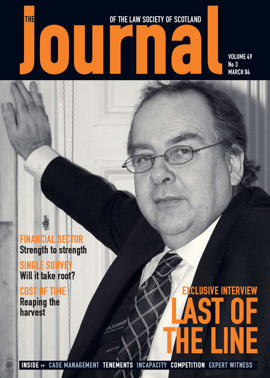Work in progress
There has been debate in the national and professional press as to the implications for the income tax liabilities of professional firms resulting from an amendment announced by the Accounting Standards Board to Financial Reporting Standard 5 (“FRS 5”) which deals with revenue recognition.
The purpose of this note is to set out the Society’s position.
Background
Published in December 2003, Application Note G to FRS 5 was drafted to formalise revenue recognition practices in the UK generally but may have important consequences for how legal and other professional services firms account for revenue and work in progress (“WIP”) in their financial statements. The Inland Revenue have confirmed that this is the basis on which they will require legal practices to calculate their taxable profits.
The Application Note applies to accounting years ending on or after 23 December 2003.
Revenue should now be recognised as required by Application Note G. Paragraph G4 of the Note states that a seller recognises revenue when, and to the extent that, it obtains the right to consideration in exchange for its performance. Paragraph G6 clarifies that the right to consideration may occur when some, but not all of the contractual obligations have been fulfilled, i.e. that the right to consideration is a commercial rather than a legal test. Revenue should be measured at the fair value of the right to consideration.
New tax treatment?
Some commentators have expressed the view that the implication of the Application Note is that it might lead to the earlier recognition of profit, as the seller’s right to consideration might arise at an earlier stage than when, for example, work is billed. At a simplistic level, in relation to some types of work, instead of including WIP at the lower of cost and net realisable value, excluding partners’ time, firms may have to treat part of the WIP as if it had been billed at selling price, and include in the balance sheet an “accrued income” amount, calculated on the basis of the selling price of that work, not merely the cost of producing it and this would include the value (as at the relevant accounting date) of equity partners’ time.
The consequence of this could be a major one-off uplift in the profits, that uplift being taxed at the marginal rate applicable to the firm, which will often be 40%. This could have adverse cash flow consequences for practices, and suggestions have been made that professional bodies make representations to the Inland Revenue for any increased tax liability to be spread over a number of years.
Equally, others have expressed the view that the Application Note primarily reinforces principles underlying the accounting practice and does not change that practice in any significant manner. If this second view prevails, there are suggestions that the change should not have any significant adverse tax consequences for the vast majority of professional practices.
If there is an additional tax charge, the precise timing of any such charge is also not clear, as that depends on whether the change amounts to a change in accounting policy, and whether it is a change from a invalid basis to a valid basis.
The Society is currently in discussion with professional accountancy bodies, in particular the Institute of Chartered Accountants of Scotland and the Institute of Chartered Accountants of England and Wales, and also the Law Societies of England and Wales and of Northern Ireland as to the correct analysis of the Application Note and the consequent tax treatment. It is hoped that authoritative clarification of the key accounting issues can be forthcoming in March 2004 and that further discussions on the tax implications can then be held with the Inland Revenue.
The Society is making representations to ensure that the nature of legal practice in Scotland is properly taken into account in the discussions about the implications of the Application Note and that any adverse effect on members is minimised.
Further guidance will be made available to members as soon as it is available. Any practitioner wishing to comment on the current discussion is welcome to contact stuartdrummond@lawscot.org.uk.
In this issue
- Consumers and their guardians
- For the United Kingdom?
- Law meets its maker
- Falconer's safe landing
- Competition and the solicitor
- Flying the flag in finance
- Last piece of the jigsaw
- A good year for most firms
- System addicts
- Putting theory into practice
- The corporate challenge
- Make money out of IT
- A first-rate presentation
- The usual experts?
- Obituary: David Stewart Williamson
- Pearls of wisdom
- Work in progress
- The quality assurance scheme
- Fair hearing with prior knowledge?
- Scottish Solicitors' Discipline Tribunal
- Managing the timetable
- Are landlords' fears justified?
- Caps the stars don't want
- Website reviews
- Book reviews
- Best foot forward?
- The new law of real burdens






